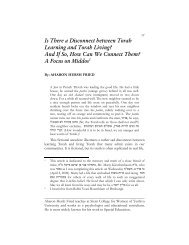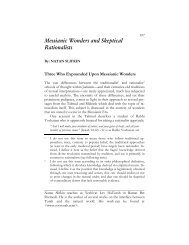A Discussion with Rabbi Shmuel Kamenetsky on âSSAâ - Hakirah.org
A Discussion with Rabbi Shmuel Kamenetsky on âSSAâ - Hakirah.org
A Discussion with Rabbi Shmuel Kamenetsky on âSSAâ - Hakirah.org
You also want an ePaper? Increase the reach of your titles
YUMPU automatically turns print PDFs into web optimized ePapers that Google loves.
A <str<strong>on</strong>g>Discussi<strong>on</strong></str<strong>on</strong>g> <str<strong>on</strong>g>with</str<strong>on</strong>g> <str<strong>on</strong>g>Rabbi</str<strong>on</strong>g> <str<strong>on</strong>g>Shmuel</str<strong>on</strong>g> <str<strong>on</strong>g>Kamenetsky</str<strong>on</strong>g> <strong>on</strong> “SSA” : 35people can change sexual orientati<strong>on</strong> is a major threat to the homosexualmovement. If <strong>on</strong>e is able to change his/her sexual attracti<strong>on</strong>,it undermines the argument that gay-identified individuals shouldbe viewed as “victims” and falsely define their essence as “gay” or“lesbian.” 5The rati<strong>on</strong>ale that a gay-identified pers<strong>on</strong> would never havechosen this attracti<strong>on</strong> voluntarily is <strong>on</strong>e of the standard ways inwhich pers<strong>on</strong>s <str<strong>on</strong>g>with</str<strong>on</strong>g> this c<strong>on</strong>diti<strong>on</strong> attempt to excuse themselves.While this oft-repeated phrase is partially correct—in most cases itwas not a c<strong>on</strong>scious choice to develop SSA—the elements of freewill and choice play a bigger role. G-d grants each of us the abilityto make choices: whether <strong>on</strong>e chooses to accept and/or celebratethese feelings, to act up<strong>on</strong> them, or to work to overcome them alwaysremains <str<strong>on</strong>g>with</str<strong>on</strong>g>in the power of each individual. The Rosh Yeshivaillustrated this point by referring to Internet pornographyaddicti<strong>on</strong> as a “terrible problem” that he characterized as “a growing<strong>on</strong>e in the Jewish community. Such an addicti<strong>on</strong> can pull peoplelike a magnet.” Nevertheless, he said, just because <strong>on</strong>e does not c<strong>on</strong>sciouslychoose a struggle or difficulty, does not mean that <strong>on</strong>e cannotovercome it.I asked the Rosh Yeshiva about the claim that homosexual attracti<strong>on</strong>sare so deeply ingrained as to c<strong>on</strong>stitute the halachic equivalentof <strong>on</strong>ess. Those individuals who argue this positi<strong>on</strong> claim that5The Rosh Yeshiva and I discussed more fully the c<strong>on</strong>cept of how an err<strong>on</strong>eousself-identificati<strong>on</strong> can be used as a crutch to prevent change. TheTalmudic account of Elisha ben Abuyah, <strong>on</strong>e of the great Sages of theTalmud, is instructive. He wandered so far from observance that he acquiredthe nickname of Acher, “the other <strong>on</strong>e,” and err<strong>on</strong>eously perceivedthat he was disqualified from repenting. When urged by his student,<str<strong>on</strong>g>Rabbi</str<strong>on</strong>g> Meir, to repent, he would reply, “There is no teshuvah forAcher” and explained how he heard a bas kol (Voice from Heaven) saying,“Turn back to me, O lost children—except for Acher.” Unfortunately,like others who falsely self-identified, Elisha ben Abuyah misunderstoodthe meaning of G-d’s words. G-d challenged Elisha to cast off the falseidentity of Acher, “the other <strong>on</strong>e,” but tragically Elisha ben Abuyahchose to identify the wr<strong>on</strong>g he had d<strong>on</strong>e <str<strong>on</strong>g>with</str<strong>on</strong>g> his very essence. In turn, hetook <strong>on</strong> the false identity and foreign pers<strong>on</strong>ality of Acher, using thisfalse identity as his rati<strong>on</strong>alizati<strong>on</strong>, or crutch, for inacti<strong>on</strong>.
















